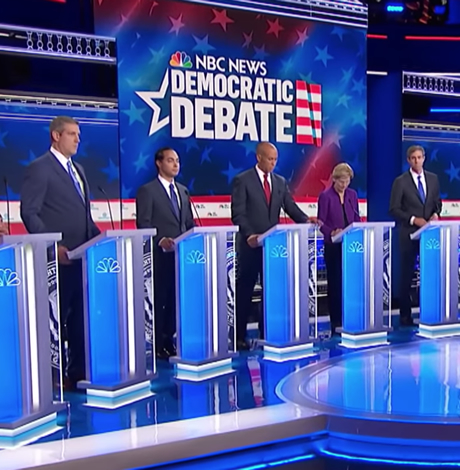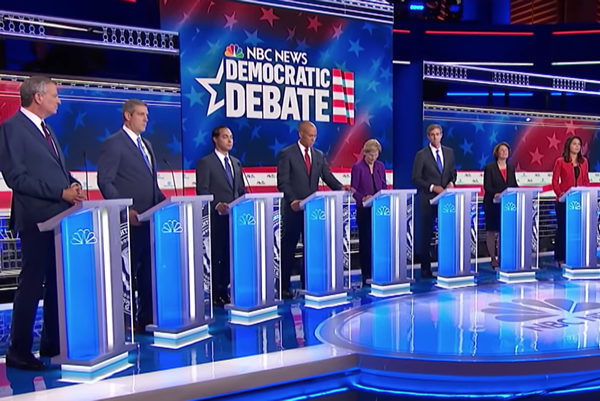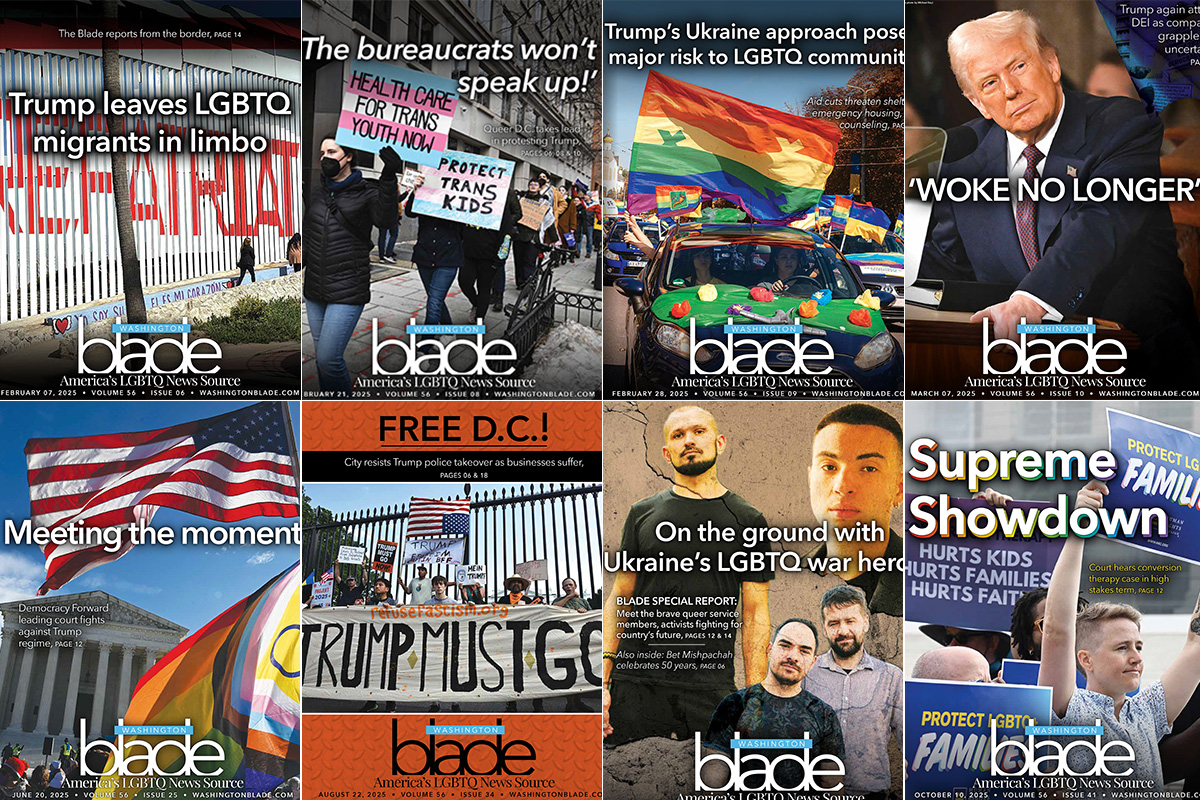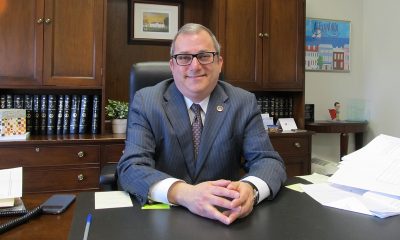Opinions
Democratic debates deflate gays, party
Extremist positions, embarrassing trans reference, lackluster appeals taint unveiling


Campaign operatives at the Democratic National Committee should be grateful that not many Americans tuned in to witness the party’s recent debacle of dual debates.
The twin episodes, broadcast on two consecutive nights, were a train wreck of both politics and performance. Dominant among both real-time and later-reflective observations by ordinary party supporters, as well as incumbent-disaffected independents, were reactions ranging between depressed and panicked.
Any thought that the top-20 presidential candidates allowed to participate would comprise a credible array of potential victors or convey a certain signal of prospective victory were quickly dispelled during a cumulative four embarrassing hours.
Although the second-night line-up set a record for Democratic presidential debate eyeballs, at 18 million viewers, that number fell far short of those watching both the first and second Republican debates in 2015 that captured the attention of 24 and 23 million viewers, respectively. The Democrats’ first-night debate was viewed by only 15.3 million.
While pundits parsed the winners and losers for each night – and there were both – the common view from living-room televisions and personal mobile devices was decidedly downbeat. Strong was the reaction assessing these contenders as a lackluster group.
The debates were one of the worst collective political performances and controversial issue narratives presented to a modern mainstream audience. It came at a moment Democrats ached to restore confidence after the party’s humiliating defeat in 2016.
Candidates seemed to forget they were addressing an entire nation and introducing themselves to a diverse electorate. Instead, they focused on fighting for support from the minority of party members eager to applaud leftist calls for much higher taxes and taking away the employer-provided private health insurance a large national majority enjoys and overwhelmingly wants to keep, while striking the most unpopular and nearly incomprehensible posture on immigration policies possible. It was a two-night kook-fest of radical issue pronouncements with scant resonance for voters.
While playing to the party’s far-left activists may produce short-term gains in seeking the nomination, eventually “walking back” those extremist positions for the general election could prove nearly impossible. Sen. Kamala Harris, deemed to have possibly jump-started her languishing campaign, is ample proof of that. Harris immediately took to the airwaves the next morning to disavow for an incredible second time her again-indicated intention to eliminate private health insurance.
Producing ridicule among LGBT voters and occurring early the first night, long-shot contender and former HUD Secretary Julian Castro blurted out a commitment to inclusion of abortion rights for “a trans female.” This declaration prompted viewers to scratch their heads in anatomical contemplation of whom he might be referencing. Chatter among gay wags dubbed Castro the “I believe in miracles” candidate, and his comment came across as a craven and awkward attempt to be the first to mention the LGBT community.
There was little additional overture to the “LGBTQ” on either evening, and consistently with that deer-in-headlights micro-pause typical of politicians bracing to correctly recite the acronym, especially when utilizing either queer-elongated or further-extended varietals. Passing reference to the “Equality Act” was made only once or twice among legislative litanies and a blur of demographic appeals.
LGBT voters over recent decades had come to mirror Hispanics when casting ballots, with upwards of one-third backing Republicans – particularly in congressional, state and local contests, and especially in non-presidential years. Current gay preferences have changed with the ascent of Donald Trump and a smaller percentage is presently inclined to support the GOP. For that reason, the public disappointment and political dismemberment resulting from the debates has noticeably deflated many in the gay community.
For party partisans and the LGBT voters desperately searching for an illuminated pathway toward ousting the current president they despise, the presentation of candidates at the debates promulgated a startling level of wariness and worry.
It’s quite possible none of them can win.
Mark Lee is a longtime entrepreneur and community business advocate. Follow on Twitter: @MarkLeeDC. Reach him at [email protected].
Opinions
Support the Blade as mainstream media bend the knee for Trump
From CBS to Washington Post, MAGA taking over messaging

We knew it would be bad. I’m referring, of course, to 2025 and the unthinkable return of Donald Trump to the White House.
We just didn’t know how bad. The takeover of D.C. police. ICE raids and agents shooting defenseless citizens in the face. The cruel attacks on trans Americans. A compliant and complicit right-wing Supreme Court and GOP rubberstamping all the criminality and madness.
Much of that was outlined in Project 2025 and was predictable. But what has proven surprising is the speed with which major companies, powerful billionaires, and media conglomerates have hopped on board the authoritarian train and kissed Trump’s ring. Tech giants like Apple and Meta and media companies like CBS and the Washington Post have folded like cheap tents, caving to MAGA pressure and enabling Trump’s evil agenda.
The guardrails collapsed in 2025. Congress has ceded its role as a formerly co-equal branch of government. Once trusted media outlets have betrayed their audiences’ trust and morphed into propaganda arms of the White House. As a lifelong journalist, this is perhaps the most shocking and disappointing development of the past year.
The Washington Post, which adopted the ominous tagline of “Democracy Dies in Darkness,” killed its endorsement of Kamala Harris in the final days of the 2024 campaign. Same thing at the Los Angeles Times. More recently, CBS’s vaunted “60 Minutes” spiked a story critical of Trump’s immigration policies under the direction of new editor-in-chief Bari Weiss, a Trump toady and the antithesis of a journalist.
Concurrently, media companies large and small are fighting to survive. Government grants have been rescinded and the Corporation for Public Broadcasting, responsible for funding NPR and PBS, announced plans to dissolve. The Pittsburgh Post-Gazette, a nearly century-old Pulitzer Prize-winning institution, announced this week it will close on May 3. The Washington Post has lost scores of talented journalists, including prominent LGBTQ voices like Jonathan Capehart. The Baltimore Sun was acquired by the same family that owns right-wing Sinclair Broadcasting, ending a nearly 190-year tradition of award-winning, independent journalism.
It is not a coincidence that Trump’s attacks on democracy, traditions, and norms are happening while the media industry collapses. News deserts are everywhere now. In 2024, 127 newspapers closed, leaving 55 million Americans with limited or no access to local news, according to a report by Medill.
There’s a reason the media are called the “Fourth Estate.” Journalism was considered so critical to the health of our democracy that the Founding Fathers spelled it out in the First Amendment. Democracy and our Constitution cannot survive without a free and robust press.
That’s why I felt compelled to write this appeal directly to our readers. For nearly 57 years, the Blade has told the stories of LGBTQ Washington, documenting all the triumphs and heartbreaks and writing the first draft of our own history. Today, we remain hard at work, including inside the White House. This week, we have a reporter on the ground in Colombia, covering the stories of queer Venezuelan migrants amid the crisis there; another reporter will be inside the Supreme Court for next week’s trans-related cases; on Sunday, we have a reporter on the red carpet at the Golden Globes ready to interview the stars of “Heated Rivalry.”
We do a lot with a little. As major companies pull back on their support of the LGBTQ community, including their advertising in the Blade, we turn to our readers. We have never charged a dime to read the Blade in print or online. Our work remains a free and trusted resource. As we navigate these challenges, we ask that you join us. If you have the resources, please consider making a donation or purchasing a membership. If not, please subscribe to our free email newsletter. To join, visit washingtonblade.com and click on “Fund LGBTQ Journalism” in the top right navigation.
Our community is known for its resilience. At the Blade, we’ve weathered the AIDS epidemic, financial crises, and a global pandemic. We are committed to our mission and will never bend to a wannabe dictator the way so many mainstream media outlets have done. The queer press is still here and with your help we will survive these unprecedented attacks on democracy and emerge stronger than before. Thank you for reading the Blade and for considering making a donation to support our work.
Kevin Naff is editor of the Washington Blade. Reach him at [email protected].
Opinions
Time has run out for the regime in Venezuela
American forces seized Nicolás Maduro, wife on Jan. 3

Time has run out for the regime in Venezuela.
I am fully aware that we are living through complex and critical days, not only for my country but also for the entire region. However, the capture of Nicolás Maduro has renewed hope and strengthened my conviction that we must remain firm in our cause, with the certainty that the valid reward will be to see Venezuela free from those who continue to cling illegitimately to power.
In light of this new reality, I adopt a clear, direct, and unequivocal position:
I demand the immediate release of all political prisoners.
I demand that all persons arbitrarily detained for political reasons be returned to their families immediately, without delay or conditions.
According to Foro Penal, as of Jan. 5, 2026, there are 806 political prisoners in Venezuela, including 105 women, 175 military personnel, and one adolescent, and a total of 18,623 arbitrary arrests documented since 2014. The same report documents 17 people who have died while in State custody and 875 civilians prosecuted before military courts, clearly evidencing the use of the judicial and security apparatus as instruments of political persecution. In parallel, the humanitarian system estimates that 7.9 million people in Venezuela require urgent assistance, further aggravating the impact of repression on daily life.
Behind these figures are shattered lives, separated families, and destroyed life projects. Students, activists, human rights defenders, political leaders, and members of the armed forces remain imprisoned without judicial guarantees, without due process, and without justice.
Since the capture of Nicolás Maduro, repression has not ceased. On the contrary, more than ten journalists have been arbitrarily detained, while others have been harassed, imprisoned, or mistreated for carrying out their duty to inform. Today, journalism in Venezuela has become a heroic and high-risk act.
This situation is further aggravated by a new attack on fundamental freedoms: an illegitimate decree of “external state of emergency”, whose purpose is to legalize state terrorism, expand the scope of repression, and deepen the criminalization of dissent and freedom of expression.
The destruction of freedoms cannot and must not be normalized, either by society or by the international community.
I do not forget the atrocities committed against people deprived of their liberty: systematic violations of due process, torture, cruel, inhuman, and degrading treatment, denial of medical care, and prolonged isolation.
These practices have been widely documented and denounced and are currently under investigation by international justice mechanisms.
In this regard, the United Nations Independent International Fact-Finding Mission on Venezuela has repeatedly expressed grave concern over the persistence of serious human rights violations, including the use of torture, enforced isolation, and the responsibility of State security forces in systematic abuses, as reflected in its statements and reports issued on Jan. 3, 2026, and throughout 2025.
From my unwavering commitment to human rights, I issue a firm and urgent call to Venezuelan citizens and to all people in the free and democratic world to stand together in defense of human dignity.
All political prisoners must be released now.
All torture and detention centers must be closed.
I am convinced that there can be no genuine democratic transition without the immediate release of political prisoners, the submission to justice of those responsible for arbitrary detentions, and the establishment of accountability mechanisms, guarantees of non-repetition, and full reparation for victims and their families. This is the only viable path toward a proper transition to democracy in Venezuela.
Today, more than ever, I stand in solidarity, inside and outside Venezuela, with the victims and their families.
This is a moment of definition, not of silence or hesitation.
I assume, together with millions of Venezuelans, that we are co-responsible for our collective reality and for the new Venezuela that we are called to rebuild.
Dignity, freedom, and justice cannot wait.
Freedom for Venezuela.
Juan Carlos Viloria Doria is president of the Global Alliance for Human Rights and vice president of Venezolanos en Barranquilla, an NGO based in Barranquilla, Colombia.
Opinions
Just say no to the felon in the White House
Democrats, media must do more to oppose Trump’s agenda

We have a clearly deranged, sick, felon as president, who can’t even remember if he had an MRI, or a CT. He says he takes enough aspirin to keep his blood running thin in his veins. He fakes health reports, and lies every time he opens his mouth. His brain appears foggier than Joe Biden’s ever was.
The felon arranged to get a fake Peace Prize from the soccer federation, while taking military actions around the world. He sanctioned American attacks on Nigeria, Iran, Syria, and now on the government, and people, of Venezuela. He has our military attacking boats, claiming they are carrying drugs, with no proof. He interferes in foreign elections, making the United States less safe. He obviously supports Putin in his war against Ukraine, and supports Netanyahu’s destruction of Gaza, and his starvation of the Palestinian people there. Because of all this it’s understandable why he calls his Secretary of Defense, his Secretary of War. That individual being unqualified with no competence, or decency — the perfect toady for the fascists surrounding Trump. He has a Secretary of State in Marco Rubio who clearly has no principles at all. Rubio previously said, “Donald Trump – a con artist – will never get control of this party…We cannot allow a con artist to get access to the nuclear codes of the United States of America.” He compared Trump to a “third-world strong man.” Now as Secretary of State he justifies all the illegal actions the felon takes.
I, and many others, question “Where is Congress in all this?” Do no Republicans in Congress have any cojones? Two Republican woman have criticized Trump — Marjorie Taylor Greene (R-Ga.) and Nancy Mace (R-S.C.). Both on the Epstein files, one on screwing the American people with regard to their health insurance. Both are now out of Congress, still MAGA, but found if you disagree with the felon, he sics his cult on you.
My other question is: When will any in the media really stand up to him? When do mainstream media call out every one of his lies, as he makes them? When do they show any guts, and repeat each day he is deranged? When do they have daily headlines, calling him out on things from his health reports, to lies about the economy? Where are the daily headlines calling out the Republican Congress for its lack of action? Why is there no representative clock on every TV network, ticking off the time Congress doesn’t take back their rightful place as an equal branch of government? When will they call out the Supreme Court, reminding people what Trump’s picks said during their confirmations, versus what they are doing now? When will they actually reclaim ‘The freedom of the press?’
Democrats must continue to speak out. I am aware they have little power in this Congress, but they must not remain silent. We have seen, when they do speak up, we win elections. They help the people to wake up, as they did in recent elections in New Jersey and Virginia. In races as distinct as the mayoralty of Miami, where a Democrat won for the first time in 30 years, and did so in a landslide; and Democrats won two special elections for State Senate in Mississippi. In Georgia, Democrats won two seats on the Georgia Public Service Commission, the first time in 20 years they won a statewide seat. And they won a State Senate seat in Iowa, and the redistricting vote in California.
To continue winning Democrats must remind people every day what the felon, and his fascist cohorts, are doing to destroy their lives. Latinos and Hispanics need a daily reminder, it is the felon who once said he supports them, whose government is now deporting them. Young people must be reminded every day, the felon is destroying the country they will inherit, their future, by denying climate change. Everyone needs daily reminders how he is destroying the health of the country. Ending research grants looking for cures for cancer, Alzheimer’s, Parkinson’s, and HIV/AIDS. Ending research grants into curing childhood diseases, development of mRNA vaccines, and other potential progress to protect Americans, and the world, when the next pandemic occurs, and it will. He is literally killing children by having his government speak out against vaccinations for illnesses like measles, considered eradicated before he came into office.
All of this needs to be headlined each day in our newspapers, and on TV, by the people who still can, and are willing, to do it. Those not bought off by, or afraid of, the felon, and his fascist cohorts. Those who don’t sit with him at Mar-a-Lago, and have become his enablers. We the people need to take to the streets and every time there is an election, use our vote to say to the sick, deranged, felon, and his fascist cohorts, ‘NO MORE’.
Peter Rosenstein is a longtime LGBTQ rights and Democratic Party activist.
-

 District of Columbia5 days ago
District of Columbia5 days agoImperial Court of Washington drag group has ‘dissolved’
-

 Colombia4 days ago
Colombia4 days agoGay Venezuelan man who fled to Colombia uncertain about homeland’s future
-

 Arts & Entertainment4 days ago
Arts & Entertainment4 days ago2026 Most Eligible LGBTQ Singles nominations
-

 District of Columbia4 days ago
District of Columbia4 days agoKennedy Center renaming triggers backlash




















